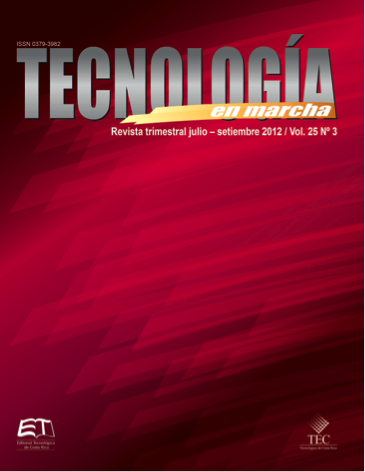Obtention of a soil improver as subproduct from the anaerobic digestion of organic residues at the Technological Institute of Costa Rica
Main Article Content
Abstract
Anaerobic treatment of organic wastes generates effluents with biofer tilizer proper ties, besides biogas for renewable energy production. The purpose of this research was to evaluate a mixture of effluents obtained from two small scale biodigesters at the TEC, with the purpose of determining its potential use as biofertilizer.
We analyzed the chemical composition and found an increase in the nutrient content of the effluents after biodigestion. We also determined the microbiological quality and observed a decrease on the fecal coliform counting. However, the bacterial concentration was still too high for allowing a safe application to crops that are eaten raw.
Fertilization greenhouse essays were also performed using lettuce crop (Lactuca sativa). We tested three treatments.The first one consisted in fertilizing the crop with fully concentrated effluents, the second one with 50% diluted effluents and the third one with a chemical fertilizer.We analyzed plant height, leaf number, fresh weight and dry weight.
Statistically significant differences were found for the first three variables, but not for the last one. In conclusion, the chemical fertilizer produced better results in the short term and the 50% diluted effluent was more effective than the fully concentrated one. We recommend using the effluents from the TEC’s biodigesters as soil improvers after applying a sanitary treatment to reduce their coliform counting to safe values.
Article Details
Los autores conservan los derechos de autor y ceden a la revista el derecho de la primera publicación y pueda editarlo, reproducirlo, distribuirlo, exhibirlo y comunicarlo en el país y en el extranjero mediante medios impresos y electrónicos. Asimismo, asumen el compromiso sobre cualquier litigio o reclamación relacionada con derechos de propiedad intelectual, exonerando de responsabilidad a la Editorial Tecnológica de Costa Rica. Además, se establece que los autores pueden realizar otros acuerdos contractuales independientes y adicionales para la distribución no exclusiva de la versión del artículo publicado en esta revista (p. ej., incluirlo en un repositorio institucional o publicarlo en un libro) siempre que indiquen claramente que el trabajo se publicó por primera vez en esta revista.

